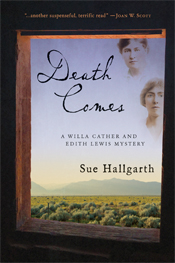Beloved author, editor, writing coach, and AFP Editorial Board member Lisa Lenard-Cook has died after long battle with cancer. Albuquerque Journal has published a tribute. We are thankful for her wise guidance.
AFP Interview with author Sue Hallgarth
AFP: What prompted you to write this novel?
SH: It began with an image, a visual image of a body dropping from a cliff. I have no idea why that image came to mind, but when it did I was curious enough to spend time considering what it would be like to see the actual event, what caused it, what would happen next, who might see it, what would happen then. When it occurred to me that the cliff could be on Grand Manan and Willa Cather’s partner Edith Lewis the viewer, I was off and writing. I remember John Fowles saying he too had a visual image—of a woman standing alone at the end of pier—that became the genesis for The French Lieutenant’s Woman. We both, it seems, also like doing research and working with historical figures and the mysterious.
AFP: In writing about Willa Cather, why choose mystery rather than historical fiction?
SH: A mystery provides its own forward motion. It doesn’t have to be linear or chronological the way historical fiction does, it just has to be logical. And it allows for all sorts of apparently extraneous happenings and characters and scenes that somehow finally fit together, so rather than focusing on a single character or place, a writer can go off willy-nilly and invite a whole village to participate. It’s great fun. Why not a mystery?
AFP: Some people might call On the Rocks a “cozy mystery.” Do you?
SH: Yes and no. I was interested in creating a comfortable sense of time and place, in this case of a quiet island retreat in the 1920s where bad things happen but off stage. Whether by Agatha Christie or Amanda Cross, cozies are generally pleasant, interesting, and often short. Sometimes a character changes in the course of the story, more often in cozies our view changes, whether of character or situation or both. That description suits On the Rocks well enough, but I also wanted to develop characters and a storyline that provide more than a “light” read. Because I based the main characters on real people in a real place at a specific time history, readers discover Willa Cather in her world and get to know Edith Lewis, her partner of more than forty years.
AFP: Where did Constable Daggett come from? And other characters not based on real people?
SH: I wish I knew. They just came, jumped from nowhere onto the page. I’m sure they contain smidgens of people and characters I’ve known from life and fiction, for Daggett a bit of Colin Dexter’s Inspector Morse, perhaps; for Little John, any number of characters from Dickens or Thackeray or the fellow I wrote a dissertation on, Robert Smith Surtees; for Rob Feeney, fellows I’ve known. But when and where they jumped from the inner workings of my—what to call it? subconscious?—they did so because the story needed them: a steady, gentle fellow who could figure things out, a comic diversion to change the pace and emphasize a point, a reflective character to store and reveal information. Once they appeared, I only had imaginatively to move inside them to know what they would say or do and what should come next. It was great fun getting to know them and following as they found their ways through the labyrinth. That is, by the way, how I created the plot. I did have general notions from the outset but none of the twists and turns. Amazing what characters can do.
AFP: Why did you choose to set On the Rocks on Grand Manan?
SH: Well, for one thing, I began with the vision of a person dropping off a cliff. For another, I spent parts of four summers on the island and loved every inch of it. With only five fishing villages, it’s small, manageable, and remote. It’s a great place for hiking, for birding, for breezes carrying pungent sea air, for whales and dolphins playing in the clearest of blue-green waters, for carrying home loaves and scones from the French bakery, for logs crackling in the tiny cod stove or fireplace to chase away the chill of damp, foggy mornings, for watching fishermen work their nets. And for another, Willa Cather and Edith Lewis loved it too, so much so they built their own cottage and spent twenty summers at Whale Cove. In On the Rocks, the island serves as a microcosm, a quiet backwater filled with diverse individuals and bristling with major issues of the time, a perfect setting for a mystery.
AFP: How do you write? And how did you stay with something as long as this book took to write?
SH: Over two decades, you mean? Clearly, I must not be the kind of writer who puts herself in a chair everyday for x amount of hours. Writing a book, any book, takes commitment and discipline. One has to really like the subject to stay with it, however long it takes. The truth is I do have commitment and discipline, and I am still intrigued by Cather and Lewis, such interesting women, so much still to be learned about their lives. The actual writing of On the Rocks took about a year, the revisions another several months. When I’m writing I do put myself in a chair, usually for three to four hours and then stop to clear my head for the next day. And I have learned to stop before I’m done, often in mid-sentence, so I have a place ready to start the next day or the next week. The reason this book took so long has nothing to do with my work habits but with the fact that life and the need to earn a living intervened. I simply discontinued my research and set the manuscript aside. For years. Then great bouts of procrastination and self-doubt took over. That I did find a way to put myself back in my chair for x amount of hours testifies to Cather’s and Lewis’ lasting fascination and the importance I feel for having others know more about them.
AFP: I understand that you were doing research for a biography on Willa Cather. Why Cather and why did you shift to fiction?
SH: The odd thing is I first planned to write a critical study of Cather’s fiction. Her books interested me I suppose in part because I grew up in the middle of this country and her settings and characters resonated with the places and people I knew. They were great but deceptively simple and, I thought, deserving of more and more serious literary analysis than they had yet received. I first shifted to biography when I realized that the Cather I knew was so different from the accepted view that I would have to explain her before I could discuss her work. The predominant view then (less so now) was that Cather was childlike, a tomboy who suddenly became a writer so devoted to art that she had no life: she had only a past, a childhood she rendered nostalgically in her novels until, disillusioned, she became a melancholic recluse. The Cather I knew did neither. She might draw on the past for some of her novels, but she was a sophisticated New Yorker and world traveler, conversant with the great ideas and people of her time, a professional who knew her art and her audience. Her novels are complex. The most difficult, The Professor’s House, for instance, or Death Comes for the Archbishop, are steeped in irony and layered with meaning. Her life was as complex and vibrant as her novels. And fiction, I decided, was the best way to reveal the richness, the complexity, and the joy in her life and in the lives of those around her.
Fred Harris, last surviving member of the Kerner Commission, reflects on America after the murder of George Floyd
Fred Harris, last surviving member of the Kerner Commission, reflects on America after the murder of George Floyd
New Events From Arbor Farm Press
 2018 readings and signings—
2018 readings and signings—
Death Comes: A Willa Cather and Edith Lewis Mystery
October 9, 2018
7 pm reading / signing
Princeton Public Library
65 Witherspoon
Princeton, New Jersey
map
October 12, 2018
3 pm reading / signing
Orleans Snow Library
67 Main Street
Orleans, Massachusetts
map
Book Events Archive
September 2018
Placitas Community Library, Placitas, New Mexico
Willa Cather Foundation, Red Cloud, Nebraska
May 2018
Sue Hallgarth, Death Comes, reading / signing at Yellow Dog Bookshop, Columbia, Missouri
January 2018
Sue Hallgarth, Death Comes, reading / signing with Kathleen Hill, Bookworks Bookstore (Albuquerque)
October 2017
Sue Hallgarth, Death Comes, reading / signings:
- Corrales Community Library
- Op.Cit.Books Taos mystery book club
- Collected Works Bookstore & Coffeehouse, joint reading and signing with author Mary Oertel Kirschner
- Bookworks Bookstore (Albuquerque)
April 2016
Page One Books, Albuquerque NM, Multi-author Reading (Corran Harrington, Lynn Miller, Bev Magennis)
Bookworks, Albuquerque NM, Publication Launch (Corran Harrington)
April 2014
Well-Read Books, Fulton MO. Reading & Signing
Columbia Public Library, Columbia MO, Reading & Signing
December 2013
Friends of the Library Author Book Signing (Corrales NM)
Sue at the booth
October 2013
Micawber’s Books Reading & Book Signing (St. Paul MN)
September 2013
Womencrafts book signing (Provincetown MA)
July 2013
Grand Manan Museum Reading and Signing (Grand Manan Island, New Brunswick, Canada)
June 2013
Princeton Public Library Reading and Book Signing (Princeton NJ)
May 2013
Moby Dickens Mystery Club Selection/Luncheon (Taos NM)
Southwest Book Fiesta Reading (Albuquerque)
April 2013
Bookworks Book Club Selection/Discussion (Albuquerque)
Corrales Book Club Selection/Discussion (Corrales NM)
March 2013
Book Culture Reading and Signing (New York City)
February 2013
Iris Studio & Gallery Signing (Albuquerque)
January 2013
Northwinds Gallery Reading and Signing (Port Townsend WA)
American Library Association Midwinter Conference (Seattle WA)
Corrales Community Library Launch, Reading and Signing (Corrales NM)
KUNM’s Susan Thom Loubet interviews author Sue Hallgarth about her Willa Cather and Edith Lewis mystery series
Sue Hallgarth shares Pulitzer Prize winning novelist Willa Cather’s little-known personal life through her mystery series. The second novel, Death Comes, is set in 1926 at Mabel Dodge Luhan’s compound and the D.H. Lawrence Ranch in northern New Mexico, where Cather worked on Death Comes for the Archbishop while staying in Luhan’s “pink adobe.” On the Rocks, the first book in the series, is set in 1929 on Grand Manan Island, New Brunswick, where Willa Cather and her life partner Edith Lewis kept a summer cottage. Check out Sue’s blog where she shares more of her research on Cather and Lewis that informs these novels.
Sue Hallgarth Radio Interview on KUNM’s Women’s Focus
Susan Thom Loubet will interview Sue Hallgarth on KUNM’s Women’s Focus this Saturday, January 12, 1-2 pm, following a conversation with Pat Reuss, formerly with the NOW Legal Defense Fund, about the Violence Against Women Act. Tune in to KUNM, 89.9 fm or stream the interview at http://kunm.org to hear Sue preview On the Rocks: A Willa Cather and Edith Lewis Mystery, to be released on Tuesday!
Arbor Farm Press website launched!
We are proud to launch ArborFarmPress.com! Our first publication will be On the Rocks, by Sue Hallgarth, available in bookstores, online retailers, and ebook sites on January 15, 2013.


